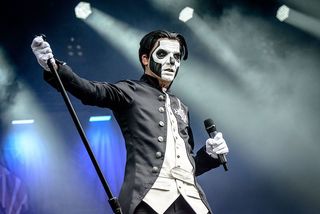Religion
The Whispering Walls of Tobias Forge
Ghost frontman discusses path to Satanism.
Posted December 13, 2018 Reviewed by Ekua Hagan
“I am all eyes
I am all ears
I am the wall
And I’m watching you fall
Because faith is mine.”
—From “Faith” by Ghost
What is the path to Satanism?
I must confess to knowing next to nothing about Satan, and therefore very little about how one may come to practice Satanism. My most vivid image of all things Satanic is being terrified watching Robert DeNiro’s portrayal of Lucifer in Angel Heart (1987). And I suspect DeNiro’s depiction is consistent with many people’s view of Satan—an entirely evil being whose sole purpose is to tempt humans to commit horrific acts, and then revel in the sadistic pleasure of being able to torture their immortal souls for eternity.
Yet as I researched the concept of Satan further, I found that Satan may take on different meanings for different people. For some, Satan is something of a cautionary tale—a tragic figure whose own ambition caused him to be thrown out of Heaven. Others view Satan as more of a spiritual concept—the tendency for humans to be tempted by their own natural instincts such as lust, hatred, or greed. And still others view Satan as almost a sad, comical and cartoonish figure—something to be laughed at rather than feared.

But for Tobias Forge, the lead singer and songwriter of the Grammy-nominated band Ghost, Satan came to represent something very different—a symbol of a rebellious libertarian-style individuality and non-conformity. As such, Forge sees his path to Satanism as a celebration rather than a condemnation of his humanity.
To understand Forge’s journey to Satanism, it is important to consider what appears to make him tick—a seemingly non-stop lust for imagination, exploration, and creativity. And perhaps just as Satan was considered by many to be the highest of all angels in heaven, so Forge was initially in awe of Christianity as a spiritual vehicle.
Forge explained how his mother was instrumental in fostering his open-minded approach to the world. “My mom is very liberal. She has never been religious … spiritual but not religious. However, she worked in art and had a very avid interest in art and culture. So she presented church to me as more of an archeological or more museum-like institution … more from a historic perspective,” Forge told me. “She took me to Paris for example. And in addition to going to the Louvre and seeing art, we definitely went to Notre Dame and places like that because it was part of the art experience. And I was always very in awe of … all of those churches … So from my mom’s side, that whole thing was very interesting and enthralling and very enticing.”
“Religion was more of a fictional art explosion.”
One church in particular that inspired awe in Forge was the Linkoping Domkyrka. “Even in my hometown of Linkoping where I grew up … the Church we had was very lavish—very boasty. So it ticked most of the boxes of big imposing Christianity. And I love being there if I’m in town … because it’s just this haunting place,” Forge explained. “The walls are just whispering there—literally because people engraved things in the stone. It goes back to the 1700s when kids were in there for Bible school and you see someone engraving his name and it says something like ‘June 3rd, 1772.’
“Seeing that when you were a kid was like, ‘Wow a message from ancient days.’”
Forge’s cultural experience included film and books that often offered an alternative and darker perspective on spirituality. “Not only did we read a lot at home, we also watched a lot of films. So I had already seen a lot of films that were about the crucifixion and the temptation of Christ, like Bible history and the Ten Commandments—stuff like that,” Forge recalled. “And I started watching horror films and you obviously have the Devil very present—The Exorcist, The Omen—all these dark powers … And religion—and more specifically because I grew up in a Christian country, Christianity—was of interest.
“Because it was just a fantastic story and it was ancient and it was filled with a lot of drama.”
More, Forge had access to music—particularly rock music—at an early age. Forge credits his brother with his music education. “My brother gave me my first records when I was about 3 or 4 years old because he bought a lot of records. And he was very nice because he gave me the records he thought I’d like more. My first records were Kiss’s Love Gun, Twisted Sister’s Stay Hungry, and Motley Crue’s Shout at the Devil. That had an immense influence on me,” he described. “When I was 8 years old I was already very interested in music. I already had my own records. I already had my own guitar. I already played guitar. I was already into many of the things that to this day I’m still deeply influenced by… a lot of '60s music—the Doors, the Kinks, Pink Floyd, and the Rolling Stones … You can go to a galaxy far, far away. And you can go into the Pink Floyd world and you can travel to Hyde Park in 1969 and watch the Rolling Stones pay tribute to Brian Jones.
“And it was a bigger, tasteful, stronger world that was so far away from the world that I lived in.”
And so it was that at an early age Forge viewed the world as one giant place to celebrate his free spirit—to explore, imagine and create. And he saw religion as a potent vehicle—along with various art forms—of nurturing his curiosity. But things changed for Forge when he encountered people whose practice of Christianity seemed geared more toward smothering rather than facilitating his spirit.
“I regarded certain people in my life … and school as handicapping … limiting. Throughout my childhood there were examples of the Christian people that I met—people who were in one form or another were devoted to any church or congregation. They were more often than not—not very nice people. They were actually quite mean and condescending,” Forge explained. “Whereas I found my stereo and my VCR and my mom and the comfort of our home was this great universe of imagination where you can tap into whatever.”
“That made me look for other religious elements.”
Forge described his encounter with a teacher whose approach to Christianity felt more like servitude rather than support. “My first teacher … she was extremely strict, mean, and deeply religious. I don’t think she followed the school curriculum—how many religious hours we were supposed to have … I remember reading a lot of Bible history. She was definitely a very authoritative woman. And she liked discipline. And she didn’t like rebellious cursing kids,” he explained. “I was pretty foul-mouthed. I was rebellious … and I questioned things. So I think we collided at first. She didn’t like me and I did not like her. And that pretty much screwed up my whole school, because I lost interest. Not in learning—but in going to school. I didn’t like the idea of teachers … and she was against me and everything that I stood for. I was looking for freedom … and she was against that.
“And she definitely became the symbol for Christianity and not being very nice.”
Unfortunately, Forge had a similar experience with his stepmother, who Forge feels resented him for interfering in her relationship with his father. “When they got together, he had this newborn kid. I was in the way of course. And she was deeply in love with my dad. And when you’re in love with someone, you want to get on with the rest of your life together as soon as possible—no obstacles. And I was an obstacle,” he described. “She was also a symbol of the not-so-nice Christian society. In one way, they were proclaiming to be advocates for being nice, and kindness and understanding, whereas I saw nothing of that.”
“And that started an interest in looking for the dark side.”
Soon, Forge started exploring Satanism as a form of spiritual rebellion against what he considered the oppressive behavior of some of the Christian people in his life. As Forge tells it, he was in many ways primed for this path not only by being open-minded and imaginative in general but also specifically by the music that he listened to throughout his life.
“As a young teen, Satan, and the idea of some sort of world that you could be in touch with that could empower you was very much the symbol for freedom … “I guess more so than I had already been introduced to by Motley Crue and Gene Simmons and Darth Vader,” he said. “When adolescence was knocking, there is another set of emotions that comes into play. And the idea of the Devil and the idea of dark powers from beyond that continue in any way or form is a very interesting thought for a twelve-year-old who wants to lose his virginity, and who would like to defend himself against the bigger kids and who is also a big worshipper of rock music. And it couldn’t have been more of a fitting marriage. Everything sort of coincided.
Forge’s interest in Satanism coincided with a cultural trend toward more extreme forms of metal—particularly black metal in which the themes were more overtly Satanic. “I think in 99.9 percent of every so-called Satanist in the last 50 years, you would find that the vast majority of them have been introduced to the Devil via music. And it usually happens at a certain age as well. And I would say that comes from bedazzlement,” Forge said. “And it was also the early '90s—so that was the rise of the death metal and black metal movement in Europe and in the world I guess. Especially in Sweden and Norway, it was a big thing. And it was just right up my alley. And it became such a powerful way of expressing myself, and how to not only deviate and differentiate myself from the norm and normal people but just like hand in glove with my way of seeing the world.”
As time went on, Forge felt that his issues were more with organized religion, which he appears to shun, as compared to spirituality, which he embraces. “Most people that I know have been in a similar mindset. It’s definitely grounded in the will to expand and not implode. And I think most of us —people like myself—are leery of linear, organized religions because it’s limiting,” he described. “Those people that tried to tell me the order of the world from a religious point of view—they tried to steer me away from believing. They tried to steer me away from feeling those feelings that I want or should have—feelings that I got through Dee Snider (“I Wanna Rock,” “We’re Not Gonna Take It”). Or “Shout At The Devil," Motley Crue. They tried to steer me away from that—they didn’t want me to believe in anything other than what they said. It goes against imagination. You’re not supposed to have imagination.
“You’re supposed to read up on someone else’s imagination.”
Forge makes it clear that he does not dismiss religion outright—and in fact still struggles with understanding many of the religious concepts he learned as a child. “I am not against the idea of believing. I am not an atheist … The whole institution of Christianity being based on that book, being based on the premise that he was conceived out of nowhere—it’s kind of hard to believe,” Forge described. “But on the other hand, I do believe in the idea of a historic person named Jesus that was a kind of chill dude who was just telling people to chill and be nice to each other. And he got penalized for that. So I’m not dismissing the whole thing as bullsh*t. But I definitely believe that tormenting other people because of the Bible and for that to be—for lack of a better word, Gospel.
“I think that is not very nice.”
For now, Forge is content exploring much of his Satanic spirituality through his work with Ghost—often taking on confrontational stage personas as “Papa Emeritus” and “Cardinal Copia.” These challenging themes are so present in Ghost’s music and live show that the band has been labeled “occult rock.” As Ghost has just released its fourth full-length studio album Prequelle and is in the midst of a world tour, Forge is aware of how he is now walking in the footsteps of the bands that had so deeply influenced him.
“It’s funny how the apple doesn’t fall very far from the tree. I’ve gone full circle being in a shock rock band nowadays, running around shouting at the devil and telling people to stay hungry and shooting love guns.”




